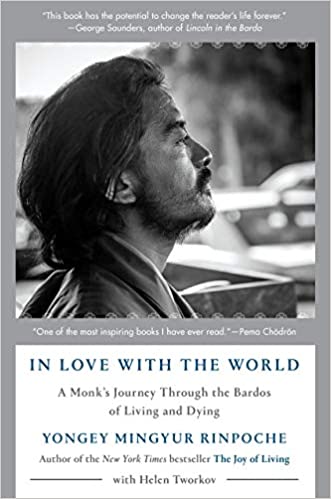Yongey Mingyur Rinpoche with Helen Tworkov
Spiegel and Grau Press
Review by Margaret Jasinski
 What Will You Do When You Are in the Bardos?
What Will You Do When You Are in the Bardos?
Have you ever felt like chucking your usual job and trying something entirely new? Have you ever had the urge for a grand adventure where you could switch identities? Have you ever had the thought of stealing away without telling anyone in the middle of the night? If these questions sound compelling, read this account of a life changing experience!
Not the usual adventure story, this book lands the reader in a unique tour of the bardo. It begins with the thirty- something Mingyur Rinpoche poised to leave his position as abbot of a monastery in India. Rinpoche is not simply seeking escape from a mundane job (in fact he is abbot of three monasteries,) he wants to take a three year retreat of a very specific kind, to live in the world and as a lay person. He takes along no safety net; in his knapsack are mere basics, one set of civilian clothes (he changes his monk’s robe, the garment he wore daily from the age of five years), two books and just enough money to live modestly for a short time with a few comforts before transitioning to living solely from alms. His is a path of no return. Other than leaving a note explaining his very unconventional actions, he left no trace of his plans at the monastery. He is free to experience the world. Or is he?
We are familiar with the traditional story of the Buddha, leaving behind his life as a prince to discover the nature of the mind. Here is a 21st century version of Buddha Shakyamuni’s journey. Mingyur Rinpoche departs from his own circumstance of comfort; he steps out of the life of a highly regarded lama in order to apply what he has learned from great teachers throughout his entire life. This is a book of discovery.
In an interview about his adventure, Mingyur Rinpoche mentioned that of the two books he brought along in his backpack, one was a Dzogchen text. Yes, Mingyur Rinpoche is a Dzogchen master, though he does not mention the word in the book. Knowing this background, the book may be read as an intimate look at Dzogchen practice; however, there are no elaborate rituals, no ornaments, no shrine room- this book is all about direct experience. Direct experience of the stomach, direct experience of putrid smells, the body sleeping on hard surfaces( the floor of a rail station) the eye seeing poverty of India and its effects.
As Mingyur Rinpoche navigates the world of the senses and the harsh realities of India, he thinks of his renowned father, (Kyabe Tulku Urgyen Rinpoche) giving him instruction, “The Bardo- what will you do in the bardos?” This is not a question to ponder about future times, this is live action where Mingyur Rinpoche lives the bardo experience. As practitioners we may wonder- what will the experience of the bardo be like? How prepared am I for the bardo? This book is a reminder that through awareness, we have the chance to know at any moment. We are in the bardo.
This rare account gives a poignant moment to moment account of situations faced with the heightened awareness of an advanced practitioner. Mingyur Rinpoche meets the bardo experience with the training of a practitioner and the body of a human being. The story is a precise account of how a master meets and integrates the experience of the body, voice and mind. We also have in these pages the auspicious flavor of life and the connections of one human being to another.
The book reminds us that at face value, we never know who we are meeting and what impact they may have on our lives. Karma has many facets and many expressions. The quiet qualities of love are related to karma and we have the opportunity to realize this in a personal way. The title of the book, “ In Love with the World,” speaks through the pages. As the title implies, Rinpoche’s unusual retreat may be viewed as a story of love. What is there not to love? We have the opportunity to discover this reality for ourselves at any time.
Why not get a copy of this inspiring book and read it- the story engages and it echoes what Chögyal Namkhai Norbu taught with great dedication to his fortunate students.
You can also read this article in:
Russian









